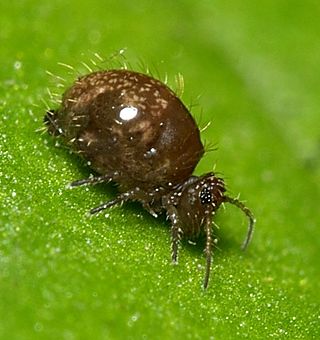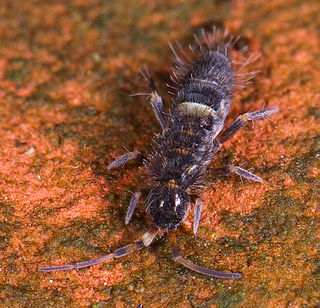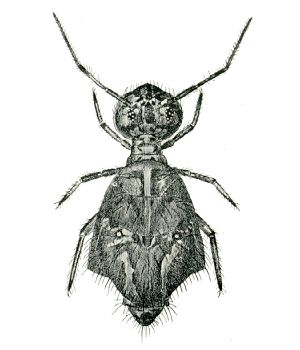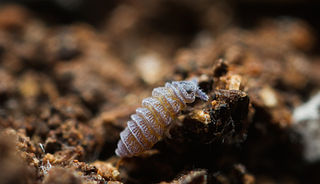
Fauna is all of the animal life present in a particular region or time. The corresponding terms for plants and fungi are flora and funga, respectively. Flora, fauna, funga and other forms of life are collectively referred to as biota. Zoologists and paleontologists use fauna to refer to a typical collection of animals found in a specific time or place, e.g. the "Sonoran Desert fauna" or the "Burgess Shale fauna". Paleontologists sometimes refer to a sequence of faunal stages, which is a series of rocks all containing similar fossils. The study of animals of a particular region is called faunistics.

The Entognatha are a class of wingless and ametabolous arthropods, which, together with the insects, makes up the subphylum Hexapoda. Their mouthparts are entognathous, meaning that they are retracted within the head, unlike the insects. Entognatha are apterous, meaning that they lack wings. The class contains three orders: Collembola, Diplura and Protura. These three groups were historically united with the now-obsolete order Thysanura to form the class Apterygota, but it has since been recognized that the hexapodous condition of these animals has evolved independently from that of insects, and independently within each order. The orders might not be closely related, and Entognatha is now considered to be a paraphyletic group.

The order Symphypleona, also known as the globular springtails, is one of the three main groups of springtails (Collembola), tiny hexapods related to insects. When the springtails were still believed to be an order of insects, the Symphypleona were ranked as a suborder.

The Entomobryoidea are a superfamily of springtails (Collembola), tiny hexapods related to insects. In the modern sense, this group is placed in an order called Entomobryomorpha.

The Entomobryomorpha are one of the three main groups (order) of springtails (Collembola), tiny hexapods related to insects. This group was formerly treated as a superfamily, the Entomobryoidea.

The order Poduromorpha is one of the three main groups of springtails (Collembola), tiny hexapods related to insects. This group was formerly treated as a superfamily Poduroidea.

Springtails form the largest of the three lineages of modern hexapods that are no longer considered insects. Although the three orders are sometimes grouped together in a class called Entognatha because they have internal mouthparts, they do not appear to be any more closely related to one another than they are to all insects, which have external mouthparts.
Amfora is a pit on Biokovo Mountain, in Biokovo Nature Park. The entry to the cave is in the upper parts of the mountain, c. 1000 meters from Sv. Jure peak, on the southeast slope of one of many pits of Biokovo.

Sminthuridae, not to be confounded with: Sminthurididae, is a family of springtails of the order Symphypleona. Sminthurids are commonly referred to as globular springtails.
In the 10th edition of Systema Naturae, Carl Linnaeus classified the arthropods, including insects, arachnids and crustaceans, among his class "Insecta". Wingless arthropods were brought together under the name Aptera.

Chaetotaxy is the arrangement of bristles (macrochaetae) on an arthropod or annelid, or taxonomy based on their position and size. For example, it is important in Diptera, in which group it was formalised by Ernst August Girschner. The term chaetotaxy was later proposed by Carl Robert Osten-Sacken.

The subphylum Hexapoda or hexapods comprises the largest clade of arthropods and includes most of the extant arthropod species. It includes the crown group class Insecta, as well as the much smaller clade Entognatha, which includes three classes of wingless arthropods that were once considered insects: Collembola (springtails), Protura (coneheads) and Diplura. The insects and springtails are very abundant and are some of the most important pollinators, basal consumers, scavengers/detritivores and micropredators in terrestrial environments.

Pogonognathellus longicornis is a common species of springtail present in Europe.

Dicyrtomidae is a family of Collembola in the order Symphypleona, and it is the only family of the superfamily Dicyrtomoidea. It includes more than 200 species in eight genera.

Neanuroidea is a superfamily of springtails in the order Poduromorpha. There are at least 3 families and more than 730 described species in Neanuroidea.

Onychiuroidea is a superfamily of springtails in the order Poduromorpha. There are about 5 families and more than 630 described species in Onychiuroidea.

Onychiuridae is a family of Collembola. This family has 600 species in 51 genera.

Desoria is a genus of springtails.
En Kaadhali Scene Podura is a 2019 Indian Tamil-language romantic comedy film directed by Ram Sevaa. It stars Mahesh and Shalu Chourasiya alongside an ensemble cast. Featuring music composed by Amresh Ganesh, the film began production in mid-2018 was released on 13 September 2019.
John Tenison Salmon was a New Zealand photographer, entomologist, academic, conservationist, and author. His primary occupation was as an entomologist; first at the Dominion Museum and then at Victoria University College.













